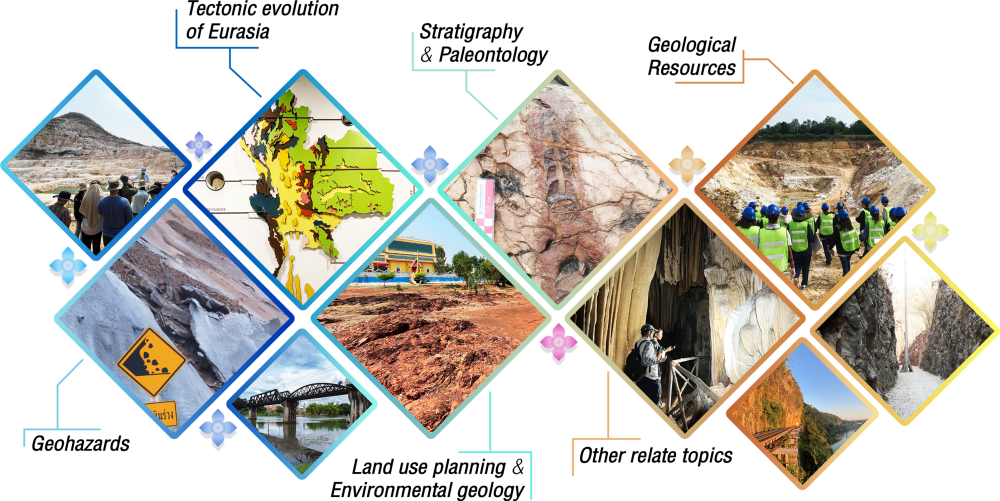Session 1 Tectonic evolution of Eurasia
Session 1 Tectonic evolution of Eurasia
Coordinator : Apivut Veeravinantanakul
The Eurasian continent, home of 5.4 billion people which cover the areas approximately 55 million squared kilometers, is formed by the dynamic process over billions of years. The dynamic nature of the Eurasian continent involves the formation of orogenic belts and geological features. This session will address the issues considering evolution of lithosphere through time and basin formation of the Eurasia to understand the relationship between the geodynamic process and development of basin systems, by using multiple lines of evidence to reduce uncertainties in interpretation.
Scope :
- Tectonics, magmatism and evolution process of Eurasian’s lithosphere
- Metamorphism processes
- Continent amalgamation and separation
- Evolution of Paleo-Tethys and Neo-Tethys
- Recent advances in geophysics: Imaging the lithosphere beneath the continents
Session 2 Stratigraphy & Paleontology
Session 2 Stratigraphy & Paleontology (including IGCP-700 : Palaeozoic Carbonate Build-ups in SE Asia) Link Website IGCP-700
Coordinator : Parisa Nimnate
History of the earth and the arrangement of rock formations also known as stratigraphy, involves the study of their composition, age, and distribution, to reconstruct the geological history of our planet. Paleontology plays a vital role in unraveling the mysteries of our past and shedding light on the story of life on our planet. By analyzing the geological features and fossils within these rock layers, geoscientists can reconstruct past environments and evolutionary processes that have shaped the planet earth over millions of years. This session contributed to our understanding of its past-present and helping us to predict its future.
Scope :
- Sedimentary records and stratigraphic correlation
- Evolution and extinction of Life
- Micropaleontology
- Ichnology
- Paleobiogeography
Session 3 Geologic Resources
Session 3 Geologic Resources
Coordinator : Piyatida Sangtong
The none renewable natural resources have played an important role in developing human civilization. They are essential to the world’s economics, community development and the well-being of mankind. This session focussed on the formation, exploration and utilization of the geological resources to understand the availability and potential of the geological resources for various industries.
Scope:
- Ore forming processes
- Advances technique for tracing concealed and deep materials
- Rare earth elements: a global perspective
- Petroleum system and petroleum resources
- Gemstones
Session 4 Geohazards
Session 4 Geohazards
Coordinator : Patchawee Nualkhao
Geohazards, arise from the dynamic nature of the geological processes, are critical natural events that pose a threat to human community and infrastructure. Often, the geohazards such as, volcanic eruptions, earthquakes, rock falls, landslides, or sinkhole collapses, occur rapidly and without much warning signal. Therefore, a long-term monitoring of the high-risk areas are necessary for risk reduction. The aims of this session are to raise the understanding of the causes, mechanisms, and effects of these events, that contributes to hazard assessment, early warning systems, the development of mitigation, and management strategies promotion of safer communities.
Scope :
- Earthquake geotechnical engineering
- Understanding the mass movement
- Subduction zone disaster: volcano, earthquake, tsunami
- Geosciences for disaster risk reduction
Session 5 : Environmental geology
Session 5 : Environmental geology
Coordinator : Narongsak Kaewdum
This session, environmental geology, will focus on the study of the earth’s systems with some significant effects on human communities. By integrating geological knowledge into land use planning and management, this session contributes to the foundation of resilient and sustainable cities that are aware of their geological context.
Scope :
- Landscape evolution and its influence on human civilization
- Groundwater and hydrogeology
- Geoscience and sustainable urban development
- Energy resources
- Carbon capture and storage
Session 6 : Open session
Session 6 : Open session
Coordinator : Songkhun Boonchaisuk
This session will cover multidisciplinary field of geoscience study. Any topics not covered in the aforementioned sessions can be presented in this session.
Scope :
- Geoscience education
- Geo-tourism, Geo-Heritage sites, Geo Park
- Forensic geoscience
- Medical geology
- Planetary sciences
- etc.
